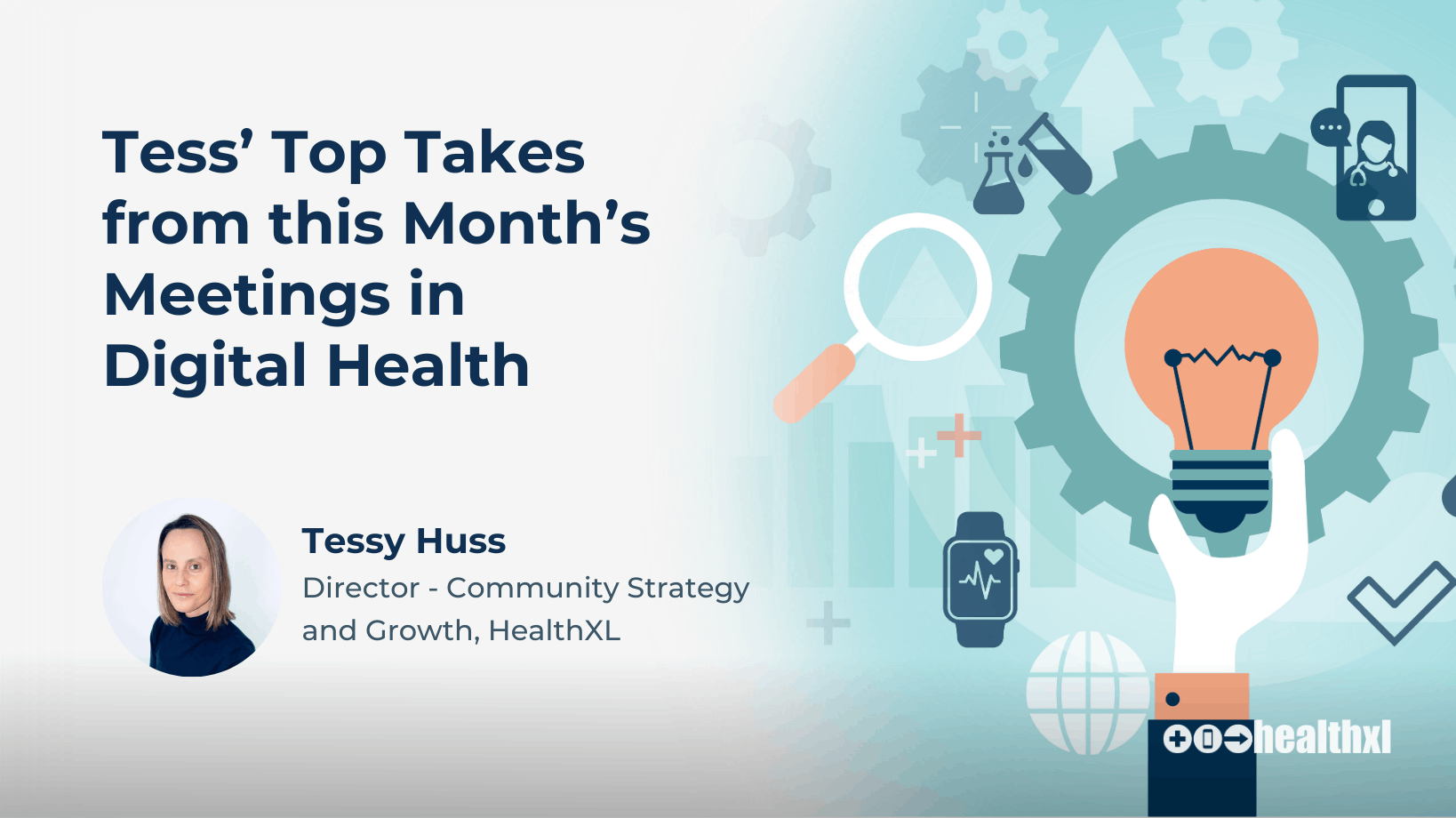Tess’ Top Takes from Last Month’s Meetings in Digital Health: April 2023
Author:
Quick Read
Our HealthXL meetings in April covered everything from ‘Data Monetisation for MedTech Companies ’ to ‘The Potential of OTC DTx Solutions’.
To make sure you’re not missing out on the top insights from our communities, and get a sneak peak at some of the conversations, here are my top five takeaways from HealthXL meetings from the past month:
Today we have cures for cancer that most people can't access – why?
In our recent masterclass, led by Jason Foster (CEO, Ori Biotech), we learned that::
The clinical success of cell therapy has been established, but the challenge lies in creating a commercially viable model. Cell therapy is expensive, due to the complexity of the manufacturing process and the high cost of goods; it requires freezing patient cells, shipping them halfway around the world, manufacturing over 10-30 days, and then shipping them back to the patient.
Today, cell therapy typically constitutes a last line of treatment. This means that patients' cells are often less healthy due to prior exposure to multiple (often toxic) treatments like chemotherapy. Therefore, selecting the right patients and deploying cell therapy as a first-line option could lead to better clinical outcomes, increased chances of long term success, and a reduction in the overall economic burden – resulting in higher returns on investment.
To make precision medicine commercially viable, and cancer treatment a reality for a large number of people, we will need to rethink the current, centralised process, and come up with methods to ensure this is given to the right people, at the right time. Once established, this has the potential to save lives across the world.
If you missed the masterclass on Making Precision Medicine Accessible and Affordable, read some more of the key takeaways here.
MedTech companies should strategically leverage both direct and indirect data monetisation opportunities.
The MedTech industry is in a prime position to capitalise on the growing trend of healthcare data monetisation. However, despite its potential value, there is still uncertainty around the most effective methods for leveraging and monetising real-world data. In this discussion, we looked at challenges and possible methods for MedTech companies seeking data commercialisation. Find out other key considerations for commercialising real-world data generated from digital health solutions here.
MedTech companies should strategically capitalise on both direct and indirect data monetisation opportunities to augment their offerings and create value for healthcare stakeholders. By bundling software platforms and data insights with medical devices or therapy solutions, these firms can enhance operational efficiency, financial performance, and clinical outcomes for hospitals. Furthermore, they can employ data-driven services to indirectly boost revenue by mitigating audits, demonstrating compliance, and ensuring quality control. This approach not only strengthens their position in the market but also serves as a powerful marketing tool to attract patients.
Pharmaceutical companies could also benefit from this holistic approach to data monetisation. By leveraging real-world data, they can optimise their R&D processes, streamline regulatory approvals, and enhance drug efficacy and safety profiles. Furthermore, the insights gained from data monetisation can enable pharma companies to develop personalised treatment plans and foster stronger relationships with healthcare providers and patients. Ultimately, this approach can drive innovation, improve patient outcomes, and create a competitive advantage for pharmaceutical companies in the ever-evolving healthcare landscape.
There is no consensus or standardised definition of what an OTC DTx is, despite their growing prevalence.
Over-the-counter (OTC) is an easy concept to describe and understand traditional drugs. Yet, defining what constitutes an ‘OTC’ version of a digital therapeutic (DTx) is more complex; they can be difficult to differentiate from other DTx solutions as well as health and wellness solutions.
Despite this ambiguity, our recent discussion on ‘The Potential of OTC DTx Solutions’ highlighted the value that OTC solutions can offer to all stakeholders: they are safe and effective treatments, with low regulatory burdens, that do not require physician oversight. But how can we ensure provider and patient adoption and trust in DTx solutions that do not require prescription?
The successful adoption of OTC DTx relies on careful positioning, using language that highlights their value and effectiveness as a treatment option, rather than portraying it as a 'nice to have.' For instance, when referring to DTx as "adjunctive," payers may assume that it adds unnecessary costs, potentially overlooking the cost-savings and value it can bring. To communicate the benefits more effectively, it may be better to avoid using such language, especially when engaging with providers, and instead focus on highlighting how DTx can complement traditional treatment or standard care to deliver synergistic effects.
Find out why we will likely see many companies shift towards OTC models in the near-future here.
Adopt a balanced risk-to-reward approach when deciding your go-to-market strategy for digital therapeutics.
In this interactive masterclass on ‘How Can DTx Companies Enter the US Market Successfully?, Jonas Duss (Co-Founder of Kaia Health) covered important topics including regulatory requirements, funding structures, and a case study on Kaia's approach to provide invaluable insights on go-to-market strategy within the US.
It was apparent that when deciding on a commercialisation strategy, companies must weigh up the risks to benefits before finalising their approach. Pushing boundaries may be worthwhile to stay ahead of competitors, but this should be evaluated on a case-by-case basis. It's crucial to seek the right advisors and law firms to make informed decisions that consider potential downside risks and competitive landscapes. The decision-making process involves analysing different risk factors, regulatory pathways, and evidence. It is critical to identify your target stakeholder and key competitors, and push the boundaries where appropriate to distinguish yourself from your competition.
Read the takeaways here to see more details on how Kaia took this risk-balance approach to successfully enter the US market.
The “med-sumer” is here to stay – MedTech needs to focus its attention accordingly.
At our recent virtual roundtable on ‘Embracing Digital Health for Hospital at Home Solutions’, Aghogho Ekpruke (Director of Innovation, Digital Health, BD), and attendees referred to consumers as the medical consumer, or “med-sumer”, who are demanding more from their medical care, and require smart connected care and patient-centric, at-home solutions.
The model of traditional brick and mortar hospitals seem increasingly less suited for this day and age. The need for alternative arrangements is further accentuated by staffing shortages, high costs, and increased expectations from the “med-sumer”. Unsurprisingly, 100% of experts at this meeting agreed that hospital-at-home solutions are a feasible alternative to in-hospital stays for patients. Healthcare must follow the money and focus on incentivising solutions that meet the specific needs of the med-sumer at this time.
Recognising the importance of the med-sumer raises the question of how pharma can adapt to this user group and address their evolving needs. To provide tailored, innovative care that improves patient outcomes and satisfaction, pharmaceutical companies must consider whether to form partnerships with MedTech firms or follow suit independently. In either case, embracing the med-sumer trend is crucial for future success in the rapidly changing healthcare landscape.
This is an important concept for the entire healthcare ecosystem,
Find out how to best meet the specific needs of the “med-sumer” here.
These are just a few key insights from some of our discussions last month. Head over to our platform to read through the takeaways from all our past meetings covering a great variety of digital health topics. Or even better, apply to attend an upcoming virtual meeting or in-person event.
See you in a HealthXL meeting soon!
